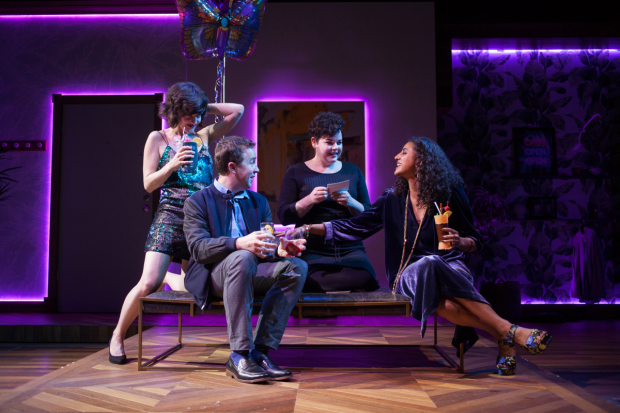In Search of a Significant Other
The play’s protagonist is never a groom, and sometimes not even a groomsman.

(© Chris Whitaker)
Joshua Harmon's Significant Other, now playing at the Geffen Playhouse, explores friendship as a buffer, a support system, and a crutch when navigating the precarious world of love. Often funny, the comedy will remind audiences of their own singlehood, past or present. Unfortunately, the play rests on the slouched shoulders of a character so uncomfortable in his own skin that the audience finds itself uninvested in his happiness.
Jordan Berman (Will Von Vogt) desperately wants to find his first love. Already in his late 20s, he's never had a serious boyfriend and obsesses about unobtainable crushes instead of bettering himself to be more emotionally attractive to others. His three female best friends are partnering up and he's becoming a wreck. Like Robert, the seminal me-generation protagonist of Stephen Sondheim's musical Company, Jordan reflects off his friends' relationships, focusing on what they have that he can't seem to find. But while the '70s-musical lead was a player with women dangling off him, Jordan is a sad sack who spends too much time thinking of what he doesn't have instead of what he can offer someone.
Jordan's plight is so identifiable, a gay man surrounding himself with women as his only outlet, that it is difficult to not rally around him and his palpable pain. However, Harmon has made him such a neurotic, self-absorbed character that Jordan's singlehood feels earned. Jordan has no wants or needs other than partnering. He doesn't seem to have many outside interests and his work ambitions are never discussed — we see him at work only to stalk the hot new employee. Everyone around him serves the purpose of being his sounding board, including his elderly grandma (Concetta Tomei). He resents his best friends for getting married because that will take away his security blankets.
With a different lead actor, possibly some of Jordan's charms could have been exposed, but Von Vogt's performance only compounds his character's desperation. Awkward and dripping with self-doubt, he's like a puppy crossing a crowded street. Two hours of fearing for his safe return is exhausting for the audience, especially if they don't enjoy his company.
Because Harmon's script emphasizes Jordan's story above everyone else's, most of the rest of the characters are one-dimensional. Only Laura (Melanie Field), the schoolteacher who had always been Jordan's plus-one until she too got married, and the only person to not coddle Jordan, is written with any depth. Field is invigorating as the "school marm" who chooses to devote to her own improvement, away from Jordan's suffocation. When Laura finds love, the audience knows it's not because she stumbled upon it, but because she took stock in her own worth and was recognized by another as someone with whom to share a life. Part of that is conveyed in the writing, but most of it comes through in Field's fearless performance.
Tomei is also wonderful as the quirky grandmother who wonders if she should check out of this world once and for all. Though the character only exists to serve Jordan and his needs, Tomei builds a winning tribute to the loneliness of knowing you've reached your final chapter. As Jordan's two other female friends, Keilly McQuail and Vella Lovell are hilarious, but they aren't given real characters to play. The same issue limits Preston Martin and John Garet Stoker, who double as both husbands for the women and potential lovers for Jordan.
Director Stephen Brackett can't seem to decide if Jordan is the hero or antihero of the story. He directs Von Vogt to be both inert and over-intense in a way that further alienates him from the audience. Bobby Frederick Tilley's costumes capture the trendy style of the Manhattan twentysomething. Sibyl Wickersheimer's sets of sliding platforms and a watering hole work well with Eric Southern's colorful lighting that creates everything from dance clubs to the neon jungle of New York. Sound designer Stowe Nelson adds to the illusion of a party just around the corner, with rumblings and disco beats seemingly heard from afar — the distance a perfect metaphor for Jordan, who is always left just outside the action.
Joshua Harmon has made a name for himself writing apt dialogue for that uncomfortable age where the protagonists are not yet mature adults but are no longer in the cocoon of schooling. The dialogue for Significant Other is rooted in relatable situations and always rings true. Jordan Berman could be a lovable protagonist if he didn't crowd the audience with his whining and egocentricity. At one point, Jordan admits his doctor wants to up his dosage of antidepressants. Maybe the audience can check back with him once those drugs have kicked in.









